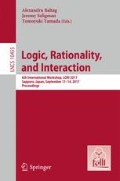Abstract
A probabilistic model for the narrative approach to reasoning in legal fact-finding is developed and applied to the gatecrasher paradox.
The research has been supported by Research Foundation Flanders.
The research was funded by National Centre for Science grant number 2016/22/E/HS1/00304.
Access this chapter
Tax calculation will be finalised at checkout
Purchases are for personal use only
Notes
- 1.
The paradox is mathematically the same as the prisoners in a yard scenario [13], where a group of prisoners commits a group killing, and it’s impossible to identify the single innocent prisoner.
- 2.
The content of the guilt statement is \(\mathtt {G}\) which has the form of \(G\equiv g_1\wedge \cdots \wedge g_l\) for appropriate \(g_1, \dots , g _l\in \mathcal {L}\).
- 3.
In contexts in which it is irrelevant whether a narration is an accusing one or not, I will suppress the superscripts.
- 4.
A set of sentences is relevant for the case if it is consistent with the background knowledge and there is a narration such that its posterior probability given all background knowledge together with that set is different from its posterior probability given all background knowledge only. A set of sentences is a minimal relevant set if no proper subset thereof is a relevant set. A sentence is relevant if it or its negation is a member of a minimal relevant subset.
References
Allen, R.J.: No plausible alternative to a plausible story of guilt as the rule of decision in criminal cases. In: Cruz, L.L.J. (ed.) Proof and Standards of Proof in the Law, Northwestern University School of Law, pp. 10–27 (2010)
Allen, R.J., Pardo, M.S.: The problematic value of mathematical models of evidence. J. Legal Stud. 36(1), 107–140 (2007). doi:10.1086/508269
Bernoulli, J.: Ars Conjectandi (1713)
Jonathan Cohen, L.: The Probable and the Provable. Oxford University Press, Oxford (1977). doi:10.2307/2219193
Jonathan Cohen, L.: Subjective probability and the paradox of the gatecrasher. Ariz. State Law J. 627–634 (1981)
Dant, M.: Gambling on the truth: the use of purely statistical evidence as a basis for civil liability. Columbia J. Law Soc. Probl. 22, 31–70 (1988)
Di Bello, M.: Statistics and probability in criminal trials. Ph.D. thesis, University of Stanford (2013)
Haack, S.: Evidence Matters: Science, Proof, and Truth in the Law. Cambridge University Press, Cambridge (2014)
Haack, S.: Legal probabilism: an epistemological dissent. In: [8], pp. 47–77. Cambridge University Press, Cambridge (2014)
Ho, H.L.: A Philosophy of Evidence Law: Justice in the Search for Truth. Oxford University Press, Oxford (2008)
Lepage, F.: Partial probability functions and intuitionistic logic. Bull. Sect. Logic 41(3/4), 173–184 (2012)
Lepage, F., Morgan, C.: Probabilistic canonical models for partial logics. Notre Dame J. Formal Logic 44(3), 125–138 (2003)
Nesson, C.R.: Reasonable doubt and permissive inferences: the value of complexity. Harv. Law Rev. 92(6), 1187–1225 (1979). doi:10.2307/1340444
Stein, A.: Foundations of Evidence Law. Oxford University Press, Oxford (2005)
Tribe, L.H.: A further critique of mathematical proof. Harv. Law Rev. 84, 1810–1820 (1971)
Tribe, L.H.: Trial by mathematics: precision and ritual in the legal process. Harv. Law Rev. 84(6), 1329–1393 (1971)
Underwood, B.D.: The thumb on the scale of justice: burdens of persuasion in criminal cases. Yale Law J. 86(7), 1299–1348 (1977). doi:10.2307/795788
Wells, G.L.: Naked statistical evidence of liability: Is subjective probability enough? J. Pers. Soc. Psychol. 62(5), 739–752 (1992). doi:10.1037/0022-3514.62.5.739
Author information
Authors and Affiliations
Corresponding author
Editor information
Editors and Affiliations
Rights and permissions
Copyright information
© 2017 Springer-Verlag GmbH Germany
About this paper
Cite this paper
Urbaniak, R. (2017). Beating the Gatecrasher Paradox with Judiciary Narratives. In: Baltag, A., Seligman, J., Yamada, T. (eds) Logic, Rationality, and Interaction. LORI 2017. Lecture Notes in Computer Science(), vol 10455. Springer, Berlin, Heidelberg. https://doi.org/10.1007/978-3-662-55665-8_44
Download citation
DOI: https://doi.org/10.1007/978-3-662-55665-8_44
Published:
Publisher Name: Springer, Berlin, Heidelberg
Print ISBN: 978-3-662-55664-1
Online ISBN: 978-3-662-55665-8
eBook Packages: Computer ScienceComputer Science (R0)


